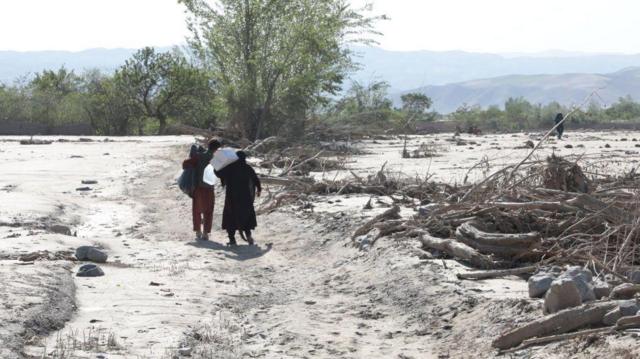Image source, Getty Images
Image caption, Floods have devastated the Afghan province of Baghlan, killing hundredsArticle information- Author, Caroline Davies
- Role, Pakistan correspondent
- Reporting from Baghlan province, Afghanistan
1 hour ago
The dramatic floods in north-east Afghanistan last week saw homes swept away, roads destroyed and hundreds killed.
Many of those affected live in remote areas many hours drive from the nearest city.
The BBC spent a day at one of the area's worst affected villages, gathering testimonies and videos filmed at the time to piece together stories of incredible rescues of children from the flood waters.
Noor Ahmad was at home with his family when the water hit last Friday.
With little option to escape and hoping the walls of his home would hold, he decided to take all eight members of his family to the rooftop.
On all sides they could see the torrent of red-brown, muddy water streaming past.
First the courtyard walls gave way. Then the building collapsed, sending all eight into the thick, fast-flowing water.
“When the wall fell, I remember thinking I had lost everything,” Noor tells me. We are sitting in a canvas tent pitched on the empty spot where his home used to stand.
“I thought, we are all finished. I was under water and was hoping, 'oh God, please take my life so my problems will be over.'”
Noor remembers hitting his head on walls, stones and tree roots as he was swept away. His left hand and right foot are tightly bandaged, as is his head.
“The skin on my head was sliced open, they had to sew a section this long back together,” he says, showing me the palm of his hand for measurement. There are cuts all along his leg. “My foot and hand are broken, but I am still thanking God I am alive and in this condition.”
Image caption, Noor Ahmad broke his leg and hand in the floodNoor survived by grabbing the branches of an almond tree. But when he pulled himself to safety, his 10-year-old daughter Zulaikha had disappeared.
Across the street from Noor’s house is a mosque which was the scene of another rescue.
In a video taken earlier, children sat huddled together and shaking on the roof, caked in thick, sticky mud. All had been dragged from the flood waters.
Image source, Contributor
Image caption, The children were pulled from the muddy waters onto the roof of this buildingHabib Ullah was one of the men who helped save them.
“I was in the mosque when the flood came through the door,” he tells me. “We were all under water. Some of us managed to get onto the roof. With the help of others, we knocked through a window. I tied the children with a shawl, then my friend pulled them up onto the roof.”
He points to them one by one. Some have cuts and bruises on their heads and faces.
In total we count eight children, the youngest just three months old.
Meanwhile downstream, 18-year-old Elhamuddin recounts how he spotted something during the floods; some movement bobbing against a large tree, lodged against the wall of his family’s field.
It was 10-year-old Zulaikha - Noor Ahmad's daughter.
Unable to grab onto roots or rocks to stop her, she was floating on her back close to a tree, scared to try to stand in case the current carried her away, Elhamuddin says.
“My father and mother said don’t go there, you will be taken by the flood, but my heart felt for her,” Elhamuddin explains. “Finally, it made me go and bring her to my home. I had this feeling I found in myself that I can do it.”
Image caption, Elhamuddin was warned that it was too dangerous to try to save ZulaikhaHe points to his chest height.
“The water came up to here. I took her on my back and I got her to our house. Most parts of her body were injured.”
In a video taken after she is rescued, Zulaikha appears covered in mud, shaken but alive. Her family tell us she is now recovering at a relative’s house.
Image source, Contributor
Image caption, Zulaikha was covered in thick mud after being rescued from the waterElhamuddin, his sister and mother say they helped to clean Zulaikha’s wounds before sending her on to hospital.
“I am proud of them,” Elhamuddin’s father tells me. “They are the pride of all Afghanistan. They are the pride of all the world.”
Today was the first time Noor had seen the family that saved his daughter’s life since she was rescued.
When Elhamuddin and his father arrive at Noor’s tent, he pulls his scarf to his face and starts to sob.
“All that is left of my home is four bricks,” Noor says. “I don’t have anything now, but even if I gave you the whole world it would not be equal to what you have given me.”
Source link
